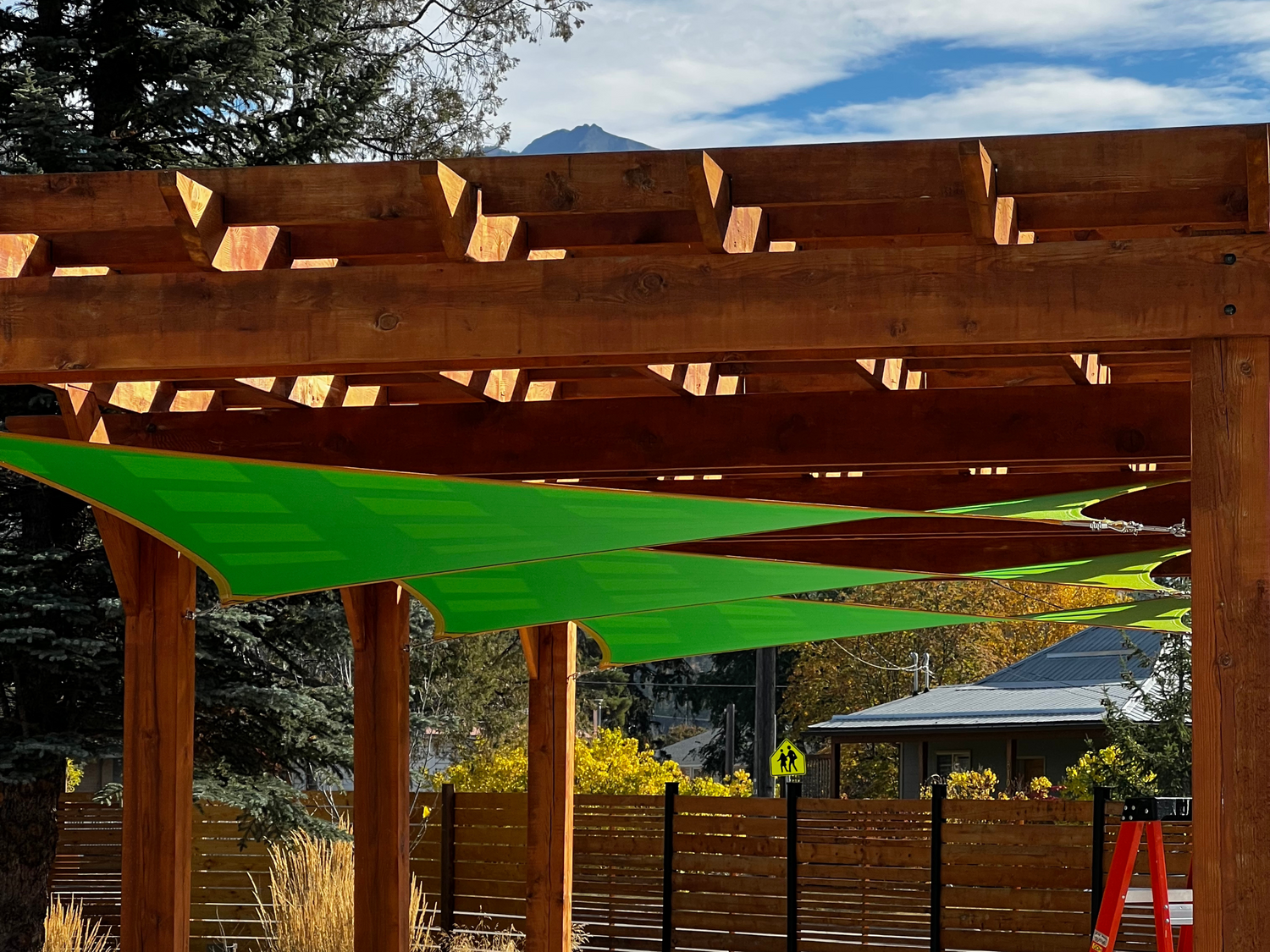Our YouTube channel includes detailed installation guides, frequently asked questions, product overviews and lots more. We are always open to content ideas so please let us know if there is a topic you would like us to cover.
Protecting Your Outdoor Furniture with Shade Sails

The art of hanging shade sails presents aesthetically pleasing and functional solutions to protect your outdoor furniture.
Hanging Shade Sails
Shade sails are not only striking additions to your outdoor environment but also serve as reliable protection against harsh sunlight, heat, and destructive UV rays - key factors in the premature aging of your beautiful outdoor pieces. As shade experts, we have collected valuable tips and ideas for hanging shade sails that you can follow to ensure your outdoor furniture's longevity and enhance your yard’s ambiance.
Hanging shade sails like a pro requires some planning and smart strategies. Begin by assessing the area that you need to cover. This step is especially crucial when considering hanging shade sails over a round pool. Determine the lowest point where the sail will be hung – this should ideally be in the direction of the sun to maximize shade.

Placement and Fixing Points
Placement and fixing points are very crucial in the process. These points could be tall posts, trees, or specially installed posts. Once you decide on the design arrangement, ensure it's evenly tensioned and at an angle to allow free flow of wind and prevent rainwater pooling.
Hardware choice is another important consideration when hanging shade sails. Stainless steel hardware is used because of its strong resistance to rust. Turnbuckles, D shackles, along with other systems are some hardware types used for a secure and tight fitting.
Choosing the Right Fabric
Choosing the right shade sail fabric is essential. The fabric is mildew resistant and capable of blocking out up to 95% of the sun's harmful UV rays, yet lightweight enough to be easily installed and removed when necessary.
Cleaning and maintenance is also a part of shade sail's lifespan. Ensuring regular clean with mild soap water and checking the tension regularly will help maintain them for years.
Some creative ideas for hanging shade sails include overlapping two or more to create a stunning artistic effect and provide more shade. Layering square and triangular sails can create a striking pattern while affording maximum sun protection.
FAQs are often about the legality and safety of hanging shade sails. In terms of legality, we advise checking with your local council regarding regulations. Regarding safety, professional installation can ensure a sturdy, secure, and durable installation.
FAQs: Hanging Shade Sails
How do hanging shade sails protect my outdoor furniture?
Hanging shade sails protect your outdoor furniture in several ways. Primarily, they inhibit the harmful UV radiation from the sun, which can cause fading and degradation in your furniture materials over time. Besides, shade sails provide a cooling shade that helps to reduce the temperature underneath, protecting your furniture from extreme heat. Lastly, depending on the material of your shade sail, it can also protect your furniture against rainfall to some extent.
What materials are best for durable hanging shade sails?
The most durable and robust hanging shade sails are typically made of high-density polyethylene (HDPE) fabric. They're renowned for their durability, longevity, and resistance to mold, mildew, and rot. Another benefit of HDPE fabric is that it blocks up to 95% of the sun's harmful UV rays.

How do I properly install hanging shade sails for maximum furniture protection?
Proper installation is key for maximum furniture protection. First, you should ensure that your shade sail is positioned to block the trajectory of the sun at its peak. This guarantees the maximum amount of shade.
The corners of the shade sail should be attached to sturdy fixed points. Ideally, stainless steel eye bolts are used for securing them into wall surfaces or sturdy posts. To provide optimal tension and wind resistance, shade sails should be installed at an angle of 20 to 40 degrees. Adjustable tensioning ropes or ratchet straps can be used to achieve this.
In case gaps are left in between the shade and the protected area, consider an overlap of multiple shade sails. Lastly, ensure your sail is taut enough to prevent flapping and sagging, which could cause water pooling during rainy weather.
Can I use hanging shade sails in all types of weather conditions?
Yes, you can use hanging shade sails in most types of weather conditions; however, there are some precautions to take. While they are great for providing shade during hot sunny days and light rain protection, prolonged exposure to heavy rain, strong winds, hail, or snow can lead to damage. In winter months, it is recommended to take down your shade sails to prolong their lifespan and maintain durability. Always consider the manufacturer's advice regarding the specific weather suitability for your hanging shade sail.
In conclusion, hanging shade sails is an effective way to protect your outdoor furniture while adding aesthetic value to your space. Thoughtful planning, careful placement, choosing quality materials, regular cleaning and maintenance are key to this process. It may also involve nuances like opting for professional installation and getting creative with layering techniques. So, whether you're contemplating hanging shade sails over a round pool or crafting an intricate arrangement for your garden, let the methods mentioned guide you on this rewarding journey of transforming your outdoor area.



